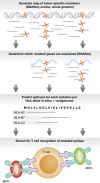The cancer antigenome
- PMID: 23258224
- PMCID: PMC3553384
- DOI: 10.1038/emboj.2012.333
The cancer antigenome
Abstract
Cancer cells deviate from normal body cells in two immunologically important ways. First, tumour cells carry tens to hundreds of protein-changing mutations that are either responsible for cellular transformation or that have accumulated as mere passengers. Second, as a consequence of genetic and epigenetic alterations, tumour cells express a series of proteins that are normally not present or present at lower levels. These changes lead to the presentation of an altered repertoire of MHC class I-associated peptides. Importantly, while there is now strong clinical evidence that cytotoxic T-cell activity against such tumour-associated antigens can lead to cancer regression, at present we fail to understand which tumour-associated antigens form the prime targets in effective immunotherapies. Here, we describe how recent developments in cancer genomics will make it feasible to establish the repertoire of tumour-associated epitopes on a patient-specific basis. The elucidation of this 'cancer antigenome' will be valuable to reveal how clinically successful immunotherapies mediate their effect. Furthermore, the description of the cancer antigenome should form the basis of novel forms of personalized cancer immunotherapy.
Conflict of interest statement
The authors declare that they have no conflict of interest.
Figures



References
-
- Altman JD, Moss PA, Goulder PJ, Barouch DH, McHeyzer-Williams MG, Bell JI, McMichael AJ, Davis MM (1996) Phenotypic analysis of antigen-specific T lymphocytes. Science 274: 94–96 - PubMed
-
- Andersen RS, Kvistborg P, Frosig TM, Pedersen NW, Lyngaa R, Bakker AH, Shu CJ, Straten P, Schumacher TN, Hadrup SR (2012a) Parallel detection of antigen-specific T cell responses by combinatorial encoding of MHC multimers. Nat Protoc 7: 891–902 - PubMed
-
- Andersen RS, Thrue CA, Junker N, Lyngaa R, Donia M, Ellebaek E, Svane IM, Schumacher TN, thor Straten P, Hadrup SR (2012b) Dissection of T-cell antigen specificity in human melanoma. Cancer Res 72: 1642–1650 - PubMed
-
- Bakker AH, Hoppes R, Linnemann C, Toebes M, Rodenko B, Berkers CR, Hadrup SR, van Esch WJ, Heemskerk MH, Ovaa H, Schumacher TN (2008) Conditional MHC class I ligands and peptide exchange technology for the human MHC gene products HLA-A1, -A3, -A11, and -B7. Proc Natl Acad Sci USA 105: 3825–3830 - PMC - PubMed
Publication types
MeSH terms
Substances
LinkOut - more resources
Full Text Sources
Other Literature Sources
Research Materials

